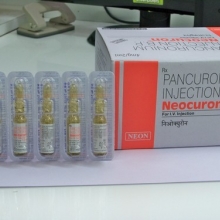Home / Categories / NEOCURON INJ.

NEOCURON INJ.
(5AMPX2)
PANCURONIUM INJ.
NEURO MUSCULAR BLOCKERS
NEON
Product Details
PANCURONIUM
| (PAN-cue-ROW-nee-uhm BROE-mide) |
| Pavulon |
| Class: Nondepolarizing neuromuscular blocker |
Action Binds competitively to cholinergic receptors on motor end-plate to antagonize action of acetylcholine, resulting in block of neuromuscular transmission.
Indications Adjunct to general anesthesia for induction of skeletal muscle relaxation; facilitation of management of patients undergoing mechanical ventilation; facilitation of tracheal intubation.
Contraindications Hypersensitivity to bromides.
Route/Dosage
Surgical Procedures
ADULTS & CHILDREN > 1 MO: IV 0.04 to 0.1 mg/kg initially. Maintenance: Use incremental doses q 25 to 60 min beginning with 0.01 mg/kg. NEONATES (< 1 MO): IV Test dose: 0.02 mg/kg.
Endotracheal Intubation
ADULTS & CHILDREN: IV 0.06 to 0.1 mg/kg. NEONATES: IV Test dose: 0.02 mg/kg.
Interactions
Aminoglycosides, bacitracin, clindamycin, colymycin, polymyxin B, inhalational anesthetics, ketamine, lincomycin, magnesium salts, quinidine, quinine, succinylcholine, vancomycin: May augment action of pancuronium. Azathioprine, mercaptopurine: May cause reversal of neuromuscular blocking effects of pancuronium. Carbamazepine, hydantoins: May decrease duration and effect of pancuronium. Theophyllines: May cause possible resistance to, or reversal of, effects of pancuronium; cardiac arrhythmias may occur. Trimethaphan: May cause prolonged apnea.
Lab Test Interferences None well documented.
Adverse Reactions
CV: Tachycardia; elevated BP. DERM: Transient rash. GI: Salivation. RESP: Respiratory insufficiency; apnea. OTHER: Skeletal muscle weakness to complete relaxation; hypersensitivity reactions (eg, bronchospasm, flushing, redness, hypotension, tachycardia).
Precautions
Pregnancy: Category C; do not use in early pregnancy. Labor: Reduce dosage in cesarean section if patient is receiving magnesium sulfate. Children: Prolonged use in neonates undergoing mechanical ventilation has been associated with severe skeletal muscle weakness and methemoglobinemia. Altered circulation time (eg, elderly patients, patients with CV disease or edema): Delay in onset of action. Electrolyte imbalance: Neuromuscular blockade may be altered depending on nature of imbalance. Hepatic or biliary tract disease: Results in slower onset and prolonged duration. Myasthenia gravis: Small doses may have profound effects. Obesity/Neuromuscular disease: Require special attention to airway maintenance and ventilatory support. Pain/Anxiety: Pancuronium does not have analgesic or antianxiety effects. Paralyzed patient will still need analgesic or sedative agents if indicated. Renal disease: Renally excreted; may require lower doses or less frequent maintenance doses.
| PATIENT CARE CONSIDERATIONS |
|
Administration/Storage
- May be diluted in 0.9% Sodium Chloride, D5W, 5% Dextrose and Sodium Chloride, and Lactated Ringer's solution.
- Have entratracheal equipment, oxygen, suction equipment, and mechanical ventilator available for respiratory support.
- Diluted solution is stable for 48 hr at room temperature.
- Store undiluted product in refrigerator (potency maintained for 2 yr) or at room temperature (potency maintained for 6 mo).
Assessment/Interventions
- Obtain patient history, including drug history and any known allergies.
- If patient has myasthenia gravis, small test dose must be administered and patient's response to administration of muscle relaxant must be monitored.
- Provide total care for immobilized patient.
- Turn patient and perform chest physiotherapy q 2 hr.
- Assess I&O.
- Check mechanical ventilator settings often.
- Monitor respiratory status closely and notify physician if changes occur. Auscultate breath sounds to detect wheezes or crackles.
- Monitor vital signs frequently during therapy to detect cardiovascular reactions.
- If respiratory status changes, notify physician.
- If respiratory secretions develop, perform suction.
- If electrolytes and blood gases deteriorate, notify physician immediately.
|
||||
Patient/Family Education
- Reassure patient and family that breathing will return to normal after pancuronium is discontinued.
- Maintain calm environment, provide reassurance regularly, and explain all procedures to patient and family.
Books@Ovid
Copyright © 2003 Facts and Comparisons
David S. Tatro
A to Z Drug Facts
